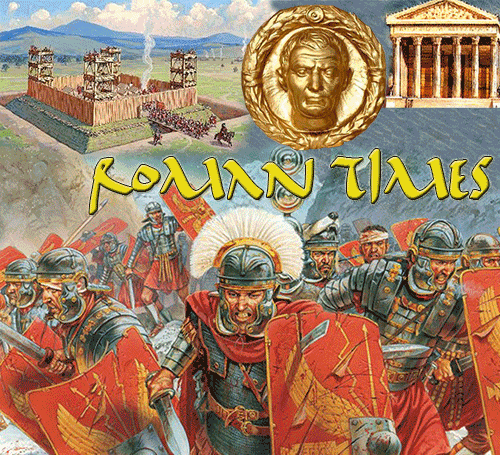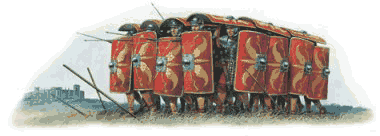The Persona for Roman Reenactors
The following articles are about building a first-person “persona.” Yes, I probably should have merged them all together, but I simply haven't ever had time or gotten around to it. (it's called laziness and a real life) Anyway, C'est la Vie! You should read them all and then glean what you can from each. The persona, if done right, will be your most successful tool in portraying the Roman milites gregarii.
Some stuff about the soldier you should read first
At the beginning of the Empire, the term of enlistment was supposed to be 16 years, though there was no regular system of discharges and men were often kept beyond their nominal retirement point. This rose to 20 years, plus five years in the reserves, by the time of Claudius. Vespasian made the term of service a flat 25 years, though discharges still seem to be given only every other year. Soldiers were forbidden to be legally married while serving, though of course many had local girlfriends, common-law wives, and children. Upon discharge, a soldier's “marriage” was recognized as legal, and any children he had were recognized as legitimate and Roman citizens. This was not only a nice “perk,” since illegitimate children of civilians generally could not become citizens, but it also built a growing pool of recruits for the legions. Over time, a steadily increasing number of recruits listed their place of origin as “in castris” (“in the camp”) meaning their fathers had been soldiers (not necessarily that they had actually been born and raised in a military fortress!).
A Reenactors Guide to the Persona: How to build one and How to Make it Work!
by DECIMvS MERCATIvS VARIANvS
(a.k.a. Marsh Wise)
Persona—Just what is this “persona” that reenactors are always talking about? “First-Person” reenacting is the portrayal of a person who is actually there… as in you are a Roman Soldier, not a reenactor who is portraying a Roman. In first-person, you become the person you portray “Hello, I am Julius Caesar…” vs. “third-person,” in which it would be “I am portraying a soldier of Legio XIIII.” You will often hear some reenactor say “I need to figure out my persona!” or… “Wouldn't it be cool if we could do a first-person impression all the time?” Yes, you do and yep, it certainly would! However most reenactors either don't know where to look, or can't think of who they want to be. Researching a persona is not that hard; it just takes a little time and study—you know, reading, books, websites, etc. vs. vegging out watching the History Channel. This article will help you to build your persona and also to give you a good foundation for acting it out.
Who Are You?
When you're figuring out who you are, there are some basic questions to ask. Among them: Who am I? Where do I live?; In a town or in the country? Is my family rich? Am I married? Do I have children? What's my occupation? Do I have a formal profession?
Persona Name
The first item that you come to is your Roman persona's name. This is usually one of the very first things a new recruit does and hopefully you will pick a good authentic, period, name for your persona. If you're having trouble with this, the following might help:
Your persona name can be your own name (if it is a Roman-type name), the name of a relative or pretty much any Roman name that catches your fancy.
Do not pick the name of someone such as “Maximus” from Gladiator—nor should you make your name “Casca Rufio Longinius” or anything like that. Famous generals and Senators are also verboten… This kinda thing is considered “cheesy” and will only end up getting you taunted. For help on this, see this REALLY GOOD article on Nova Roma's website that helps choose a Roman name, it has a lot of really good, RESEARCHED, information on how the Roman name was made up (and some more tips on things that you probably shouldn't use for your name).
Social Class
What social class do you come from? Then like now, there were different classes in society; Pleb or Equestrian? Understanding the class system of Rome is important to understanding how you feel about politics, taxes and life in general.
Where are you from?
In the Roman Empire, just like in the US, there was “Home-Town” pride. If you were from the a certain city or province, you would usually let others know it, and even if you didn't, many little things—such as the way you spoke, the clothes you wore, mannerisms, etc. would have given you away—in this manner, it was the same “back then” as now.
Choosing a town or city is relatively easy; the Roman Empire built its units on a regional basis, so find some city or town that interests you.
Anyway, here's how to do it: Find a map of the Roman Empire (the 'Net is good for this), then narrow it down to a town or village. Try not to use a modern map of Italy, as things will have changed some.
As you look at the map, you will see that there were a multitude of little towns and villages in the Roman Empire, of course, there were many which won't even be on a map. My advice is that unless you have some kind of heartfelt attachment to say Roma or Pompeii or some other such city, then pick a small town or village. Anyway, go ahead and pick one! Then to do this right, try and get a more detailed map of just that area (or even the town, if you can find it) you want to be from—of course, this might be easier if you are “from” Pompeii, where the old city still exists thanks to Mt. Vesuvius…
Birthday and your Age
Okay, now that you have a home, when were you born? You can set your own age, but make sure it is reasonable. there is a big difference between 24 and 64! Also, our time period is from 60AD to 70AD, add to that the years of service of a Legionnaire was 25 years. Therefore, your age should reflect when you were born. It you are 24, you can subtract your persona's age from, say 65AD, making your birth year 31AD. You can pick your birthday at or near your own because it is easier to remember. A note on this: you might want to add a couple years or so to your age so as to not grow out of your impression too quickly.
Some things to think about. Who was Emperor when you were born? What were significant events that occurred as you were growing up? These are all important questions within the context of your age. It is more than a number, it is the experience of life.
Roman Dates and Calendar
The ancient Romans did not use days of the week and number their days of the month as we do today. The ancient reckoning of days of the month was by counting back from either the Kalends, Nones, or Ides of the month. Counting was done inclusively; i.e., the third day of Januarius would be reckoned “three days before the Nones of Januarius” or “III Non. Ian.” The year begins with the month of Martius (March) (this was later changed to the month of Januarius (January) by Gaius Julius Caesar, but Nova Roma [where I found a lot of this neat info] retains the earlier, more traditional starting date).
On days labeled “Market Day” the Citizens of Rome would enter the city to buy and sell their wares and produce. They would share the news of the day and the bonds of community were certainly strengthened.
Family
Now, let's think about your family. Are they still alive? Who is your father and what are his interests? Most people have a profession—what is his? How about your mother, what is her name? Are you married? As a Roman soldier, you're not supposed to be, but many were. Anyway, if you are, make up a nice Roman name for her—go for it, I'm sure she'll be thrilled with your choice. Any kids? If so, “Roman-ize” their names.
Conversation
While scenarios are underway, try to maintain a “first-person” impression—talk about period topics and concerns, carry out period activities, and act like it's “AD 65” (as much as possible). You should also try and speak Latin as much as possible. You don't have to do these things all the time, but when in a period situation, like when an attack is underway, you are bringing in a prisoner, standing in front of touronz, etc., do your best to play your part as a Roman Milites.
Remember the soldier did not always talk about his uniform, armor, equipment or weapons. To him, these items were part of his job, not a hobby. Would you like to think about, talk about or even be reminded of your job all day, all the time? Of course not, then just like now, soldiers wanted to try and escape from their “job,” that's why they pursued other amusements. What is happening in the Empire NOW? Do you like to gamble? Got a pair of dice? Games, the Romans loved games - what are some of them?
Hobbies
What are your hobbies? Don't say reenacting, of course, it didn't exist then. Perhaps you like music, gambling, the games, sports, or maybe just drinking? Possibly you are a poet!? Maybe you traveled before you joined the Legion? Whatever your persona does, try and make it something that you enjoy now; something you have knowledge about (or barring that, something you feel like studying). These are just a few of the details which you should think about.
Use of the Latin Language and on using an Accent
Remember, when trying to maintain historic accuracy in the presence of the “Publick” or enemy troops, members who speak no Latin are asked not to make loud conversation in English, spout “Monty Python-isms” and to, in general keep usage of the English language to a minimum. You could try and accent when you DO need to speak English in front of the public, but we really need to think this one over and work out how it should sound.
Each member (if he doesn't already have a knowledge of Latin) should try and familiarize himself with the Latin words for parts of his kit, as well as the most common military terms. Tapes/CDs of these terms will hopefully soon be available [well, keep after us on that one] Those who do have a working knowledge of the Latin language are greatly encouraged to speak Latin as much as their fluency permits (Don't be “elitist” about it though, we want to help people have a better experience, not drive them away!).
Being in the Role
Nothing irritates me more than seeing an otherwise authentic Roman soldier yell out “Hey Romans, come on guys! First squad with me, second squad with Joe. Everyone fall-in.” Ugh! This sounds like CRAP!!! Instead, how hard is it to say: “Ad Signum”. Doesn't that sound much better? Of course it does, it was in what I call “Pidgin-Latin,” which anyone can do! Most of us could figure out what was just said there—especially with a little practice and study. Look through the Latin terms above and start to try using common words and phrases in your everyday reenactor speech. Also, STOP calling it a “helmet,” it's a cassis (cah-seess). And, you don't have a sword or a spear — they're a gladius and a pilum. Soon, you'll be using these words without thought, much like most of us already do with the word lorica.
This isn't all there is to your persona, but it will put you on the road to it's completion! I expect to hear about your persona at the next reenactment.
Appearance
What did a soldier of the Roman Legions look like? We already know a bit about his uniform, armor equipment, etc. But what did the actual person inside all of this look like?
Hair — For us, it's not so bad as for reenactors of later periods — you don't have to have weird, military haircuts that will get you shunned by your wife and co-workers alike. And… you can have facial hair, but what you can't have is a bizarre modern haircut like “corn-rows” or a ”mohawk” and the color, it needs to be natural — no neon blue hair please (not even with the Celts)! Also, from evidence, it appears that Roman soldier's hair was shorter, rather than long, but saying this, it doesn't have to be a “buzz-cut" — look at photos of Roman statues and art to get an idea of the hairstyle.
Glasses — This is a biggee! There weren't eyeglasses then and, as glasses are really noticeable and detract greatly from the impression we are trying so hard to do, we don't generally allow them. More so, eyeglasses ruin the feeling of “being there” for everyone else. So, wear contacts, or… do without your glasses. But note, if you are going without your prescription eyewear, make sure that the unit commander and others in the unit know—this is for your safety, as well as that of everyone else at the event. And last, please don't whine about the “Americans with Disabilities Act”… this is reenacting (not a Renaissance Faire) — we are trying to do it right, the point is not to allow everybody to play or to make them “happy-happy, joy-joy” it's to do it right.
Tattoos — Perhaps some kinds of tattoos might be acceptable, but if you have modern-style tattoos, you will need to figure out a way to cover them up — either with clothing, “cover-up” makeup or something. No visible USMC or Harley Davidson tattoos please. Okay, we might give you “points” if you get an SPQR tattoo. But there is no evidence that it was the "MARK OF THE LEGIONS" as a ":certain" movie assumes. However, Celts did paint their bodies blue and/or had designs painted on them as well. BUT, any design should be based on Celtic traditions. Impersonating a Celt is much more than blue body paint and infantile finger paint designs! Respect the culture and do it right. Look at ancient Celtic artwork for ideas — take it seriously! Please remember one of our stated goals is learning about the ancient cultures of Roman and others (even Celts!).
Weight — We might not all be spring chickens and models for some fitness magazine — but no one will tell you can't reenact! Just remember, you're the one who will have to carry your gear, while wearing armor, marching, fighting and standing in the hot sun. Without nagging, being in better shape is something we should all strive for
Age — Older soldiers are allowed! Ancient periods are a lot more forgiving here — certainly, we don't all need to be 19 years old  Remember that the service of a Roman soldier was 25 years! There are also plenty of things to do once you get too old to portray a soldier… civilians such as a merchant come to mind.
Remember that the service of a Roman soldier was 25 years! There are also plenty of things to do once you get too old to portray a soldier… civilians such as a merchant come to mind.
Chewing Gum — NO! just NO!!! — don't do it! No chew either.
Tobacco — NO! This is NEW WORLD STUFF!!
|
“The true test of a leader is whether his followers will adhere to his cause from
their own volition, enduring the most arduous hardships without being forced to do so, and remaining steadfast in the moments of greatest peril.” |












